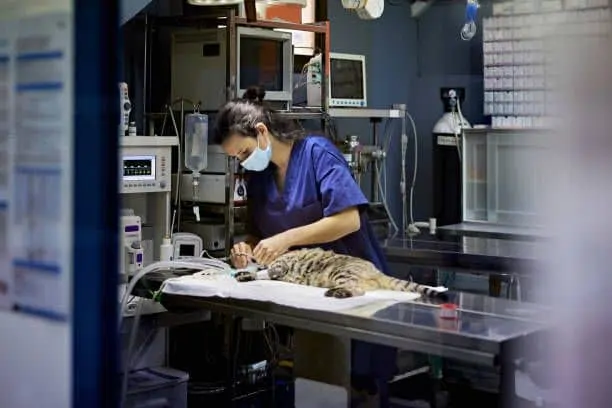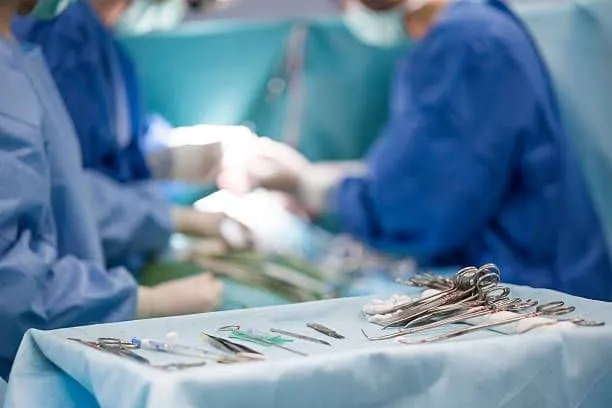General Surgery:
Gunnison Veterinary Clinic & Critter Sitters is equipped to handle both routine and more complex surgical procedures. We offer a safe and comfortable place for pets to have surgery.
Gunnison Veterinary Clinic & Critter Sitters is dedicated to ensure positive surgical outcomes for our patients. We individualize our pre- and post-operative protocols for each patient's needs and pre-existing conditions. Our experienced veterinarians perform many surgical procedures, including: spays, neuters, mass removals, enucleations, stomach/intestinal surgery, bladder surgery, cesarean sections, luxation repairs, limb or toe amputation, dewclaw removals, and more.
Anesthesia:
Before Anesthesia
We require each pet prior to receiving anesthesia to have an in-depth physical exam by your veterinarian. Because there are general risks inherent to going under anesthesia, especially for pets that are very young, old, or ill, we do recommend a few preoperative diagnostic tests to check on your pet's health. We are looking for any indications of underlying medical problems or increased likelihood for anesthetic risk. These tests may include blood tests, an EKG, x-rays, and/or ultrasound. If you have any questions about your pet's health or their risk under anesthesia, please reach out to your veterinarian for help in making an educated decision.
Prior to anesthesia, your pet will be administered a pain medication and a sedative injection to ease the process and reduce their stress. An intravenous catheter is then placed to administer intravenous fluids and any additional medications they may need.
During Anesthesia
While under anesthesia, your pet will receive constant care and monitoring. This includes an ET-tube inserted into your pet's windpipe (trachea) to provide oxygen and deliver anesthetic gas; warming blankets and temperature monitoring to prevent hypothermia (low body temperature); pulse oximetry to measure the oxygen in your pet's blood; electrocardiography (EKG) to monitor your pet's heart; blood pressure monitoring; as well as, intravenous fluids, medications as needed.
After Anesthesia
Once the surgical procedure is done, your pet will be closely monitored during their recovery in a warm, quiet, semi-dark area. When your pet is awake enough to swallow normally, the endotracheal tube is removed. Depending on your pet’s procedure or medical condition, they may be sent home later that day, or he or she may need to remain in the hospital.
Spays & Neuters
Help your pet live a long, healthy life.
How can my pet benefit from spaying or neutering?
Spaying and neutering your pet helps them live long, healthy lives. Having pets sterilized can reduce their likelihood of developing certain infections and cancers later in life, as well as unwanted pregnancies and pet overpopulation. Time of sterilization can depend on your pet's specific needs (breed, adult weight expectation, patient's purpose, etc.) If you have further questions, please reach out to your veterinarian to help you make an educated decision.
Other common issues that spaying and neutering help prevent include:
- Potentially life-threatening uterine infections (pyometras).
- Cancers of the mammary glands, testicles, or prostate that can spread to other parts of the body.
- Unwanted behavioral problems such as territorial marking, aggression, and/or roaming.
What happens when a pet is spayed or neutered?
Your pet is placed under anesthesia and a small incision is made to remove certain reproductive organs. The incision will then be closed with sutures and your pet rests until they are ready to go home!
After surgery, your pet will be required to wear an e-collar to prevent them from licking and chewing at their sutures. They may appear sleepy after surgery, which is normal. Please call your veterinarian if you become concerned about your pet’s health or behavior following surgery.
Advanced Surgery
Whether your pet is visiting us for a routine or complicated procedure, all of our patients will be assigned a dedicated veterinary technician that monitors heart rate, oxygen levels, respiration, and blood pressure. This veterinary technician monitors your pet the entire time your pet is under general anesthesia. Your pet may also require a veterinary technician to scrub-in to assist the doctor during specific procedures and emergency cases. Our compassionate surgical team takes every case very seriously to ensure that each and every patient receives the best care at all times.
Our clinic performs most soft tissue surgeries your pet may need including:
- Biopsies
- Mass Removals
- Gastropexy
- Abdominal Exploratory
- Gastrotomies
- Enterotomies
- Cystotomies
And certain orthopedic surgeries such as:
- Dewclaw Removals
- Luxation Repairs
- Limb or Toe Amputations
- And More!


